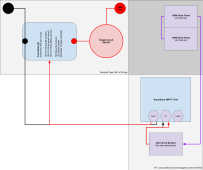RudyGreene
New Member
Hi folks! I'm new here and found this forum after watching some of Will's recent videos. It's a fantastic resource and I think I've learned enough to describe what I currently have and what I want to achieve with a new system. I live in a minivan and I want to upgrade my solar/battery setup to power a diesel heater.
My current setup is a Goal Zero Yeti 400 inside an approximately 14"x14"x10"H vented space under the floor. It's fed by a 220W portable/flexible solar panel that I manually place over the windshield on sunny days. This setup was purchased secondhand about seven years ago so it's usable Ah capacity is probably in the single digit range by now. I use the Yeti to charge my phone/laptop and it usually retains enough energy to run the lights/fan overnight. I've determined it's not worth spending $99 replacing the 33Ah AGM battery in my GZ; plus I want extra capacity.
Given my space constraints, I'm tempted to buy another integrated power station such as a refurbished Delta Mini ($549). But I can't be sure it's DC outputs will handle the draw needed to warm up a glow plug (up to 10-12A from what I've read online). The current objective is to build the simplest possible solar->battery system. I value safety, reliability and low maintenance over having lots of features.
The solar upgrade path seems pretty straightforward: Ditch my 220W fabric/folding panel and roof-mount 2x 100W glass panels. Easy. I rarely see more than 60W from my cheap "220W" panel so going rigid should be a significant performance improvement.
The battery upgrade path is trickier because everything needs to fit in the same spot as the Yeti and still have room for air circulation. My plan is to attach a small SCC and a small fuse block directly to the exterior of a SOK 100Ah battery using heavy-duty 3M dual-lock tape.
My wiring diagram (attached) takes inspiration from Will's "Minimalist Solar Package" and the "Milk Crate Solar Power System" which both exclude bus bars in favor of wiring the SCC directly through the fuse block. Once installed in the van, my battery system is not easily accessible so I would only be disconnecting the panels and battery when servicing it. I'm just not yet confident about what can safely be eliminated for an absolute minimal battery system. Here are my newbie questions:
My proposed parts list totals $855 (excluding the solar panels): https://www.currentconnected.com/share-cart/QKF1F3
My current setup is a Goal Zero Yeti 400 inside an approximately 14"x14"x10"H vented space under the floor. It's fed by a 220W portable/flexible solar panel that I manually place over the windshield on sunny days. This setup was purchased secondhand about seven years ago so it's usable Ah capacity is probably in the single digit range by now. I use the Yeti to charge my phone/laptop and it usually retains enough energy to run the lights/fan overnight. I've determined it's not worth spending $99 replacing the 33Ah AGM battery in my GZ; plus I want extra capacity.
Given my space constraints, I'm tempted to buy another integrated power station such as a refurbished Delta Mini ($549). But I can't be sure it's DC outputs will handle the draw needed to warm up a glow plug (up to 10-12A from what I've read online). The current objective is to build the simplest possible solar->battery system. I value safety, reliability and low maintenance over having lots of features.
The solar upgrade path seems pretty straightforward: Ditch my 220W fabric/folding panel and roof-mount 2x 100W glass panels. Easy. I rarely see more than 60W from my cheap "220W" panel so going rigid should be a significant performance improvement.
The battery upgrade path is trickier because everything needs to fit in the same spot as the Yeti and still have room for air circulation. My plan is to attach a small SCC and a small fuse block directly to the exterior of a SOK 100Ah battery using heavy-duty 3M dual-lock tape.
My wiring diagram (attached) takes inspiration from Will's "Minimalist Solar Package" and the "Milk Crate Solar Power System" which both exclude bus bars in favor of wiring the SCC directly through the fuse block. Once installed in the van, my battery system is not easily accessible so I would only be disconnecting the panels and battery when servicing it. I'm just not yet confident about what can safely be eliminated for an absolute minimal battery system. Here are my newbie questions:
- Will it be safe to use a 60A fuse and 6 AWG wiring instead of the large 250A "catastrophic" fuse I see in other van designs? I don't use an inverter and there is no scenario where I would be drawing more than 30A continuously from the house battery.
- Do I need that main disconnect switch? I assume I could just hand disconnect the positive cable directly from the battery, but I'm still unsure about what are the best practices (or if some of these choices are mostly for convenience versus safety).
- Do I need a breaker on the PV input? There's one in my design because lots of van builders include them, but Will's design doesn't show one and the Victron manual only mentions fusing the battery and SCC.
- How do I properly ground a mobile solar configuration? And would that grounding method change if I add a DC-DC charger later?
- Is there anything else non-essential I can remove?
- Is there anything essential that I'm missing?
My proposed parts list totals $855 (excluding the solar panels): https://www.currentconnected.com/share-cart/QKF1F3
Attachments
Last edited:



